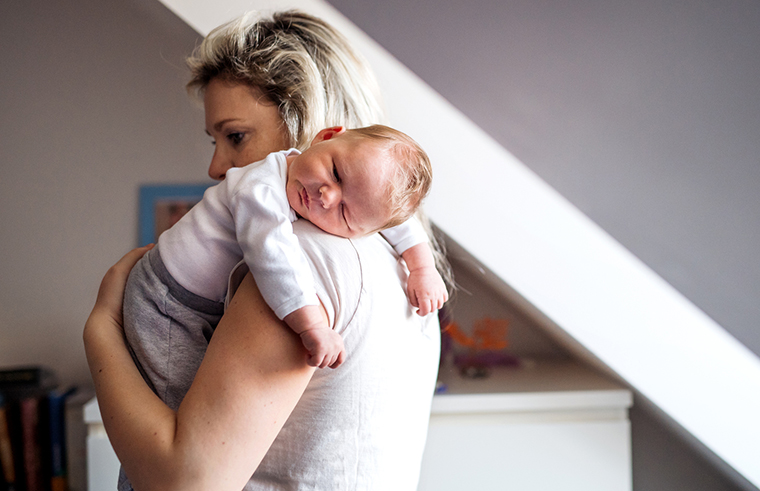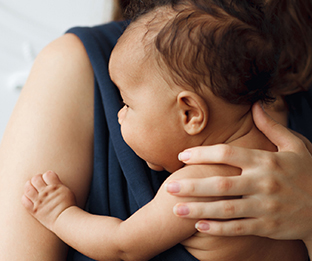7 newborn behaviours you DON’T need to worry about

There’s no time more amazing than when you bring your new baby home from hospital to begin your new journey together. However, with sleep deprivation, hormones and conflicting advice thrown into the mix, this time can also be pretty confusing too.
Your unique baby may do things differently to your sister-in-law’s baby, or to the ones described in the baby book you have. You may be receiving advice that differs from what you’d like to do as a mother, or your instincts might be at odds with what your in-laws are suggesting.
All this can leave you questioning whether your baby’s behaviour is normal, and what exactly you’re supposed to do about it. To help you through this hazy part, here are some completely normal behaviours your newborn might exhibit, and what you need to know about them:
1. Cluster feeding
If you find your newborn going through periods of ‘frenzied feeding’ where he wants to feed very frequently over a short period of time, don’t fret. This is not indicative of low milk supply, but rather your baby’s efforts to get a little more milk at certain times of the day, or during growth spurts.
Although this process can be tiring for you, try not to stress about it. Cluster feeding tends to even out as your baby gets older and your milk supply is firmly established.

2. Night waking
Your new baby has no idea of the difference between day and night so will continue to wake for feeds and comfort during the night as well as the day. Despite what some baby sleep consultants might try to tell you, this behaviour is completely normal and even biologically necessary for your newborn’s wellbeing and survival.
The good news is that the night waking will decrease as your baby gets older. To help you, ask your partner to assist with getting bub back to sleep after a feed so you can get back to snoozing more quickly.
3. Catnapping
Newborn sleep cycles last about 40 minutes, which means that your baby may stir after a short period of sleep – this is what’s known as ‘catnapping‘. You may be able to watch from a distance and see that he settles himself back to sleep, or he may need your help to slip back into slumber, either with some hands on assistance or a cuddle to help remind him that he’s still sleepy.
Because it’s impossible to spoil a newborn, you can also consider using a baby carrier or taking him for an extended push in the pram to help keep him asleep between sleep cycles.
4. Partying at night (and sleeping all day)
You might remember that when your baby was in utero, he’d be super active at night when your body was still and you were trying to get some blessed sleep. This habit of sleeping all day in your cosy womb while you moved around, continually rocking him to sleep, and partying at night while you were lying down may be a hard one to shift at first.
You can slowly reset his internal clock so he can learn the difference between day and night by keeping day times bright and active, with plenty of normal noise, and making nights as boring as possible, with minimal stimulation during feeds.

5. Sleeping only in your arms
Your baby has just spent nine months in the cosy confines of your womb, which was like being cuddled 24 hours a day, so it’s only natural for your newborn to want the contact and warmth of physical touch to help him sleep once out in the real world.
Two things to remember here: a newborn snuggled and snoozing in your arms is one of life’s greatest pleasures which won’t last forever. Secondly, it’s impossible to spoil a newborn. So do your best to push away worries about ‘bad habits’ or ‘rods for your back’ and enjoy the extended cuddles.
6. Refusing to be put down
Similar to the above, many newborns hate being put down and separated from you, which can make you go a little crazy, especially if you want to use both of your hands to eat or something.
Again, this is normal newborn behaviour, and just good old biology kicking in again – to increase his chances of survival, your newborn doesn’t want to be separated from you, preferring to be close to his food source. A baby carrier can be your best friend here.
7. Fussing and fretting
Your baby has a lot to get used to in the real world, so periods of unsettled behaviour are to be expected. As long as your baby can be settled with a breastfeed, cuddle or some other technique that soothes him, there is really nothing to worry about here. Quite often the culprit behind unsettled behaviour is over-tiredness, so try to pinpoint your newborn’s tired signals early on to make sure he gets the sleep he needs.
 Need some more baby sleep advice? Our Parent School sleep experts can help. Click to find out more or book a one-on-one session.
Need some more baby sleep advice? Our Parent School sleep experts can help. Click to find out more or book a one-on-one session.









